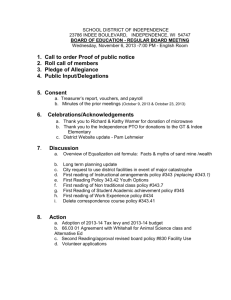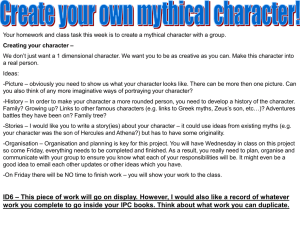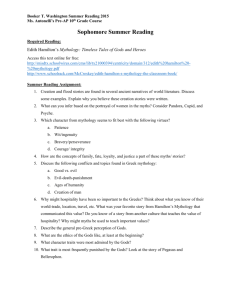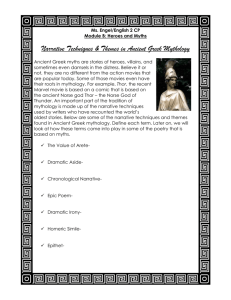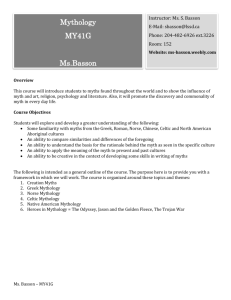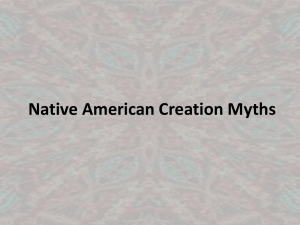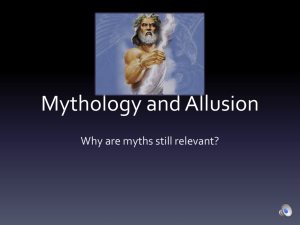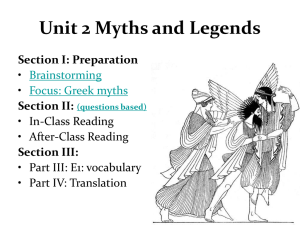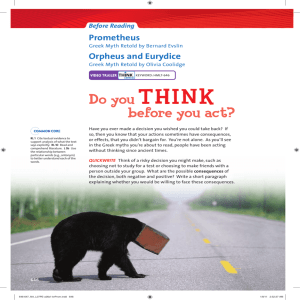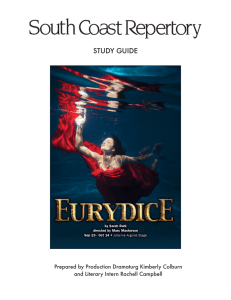Greek and Roman Mythology in Western Literature
advertisement
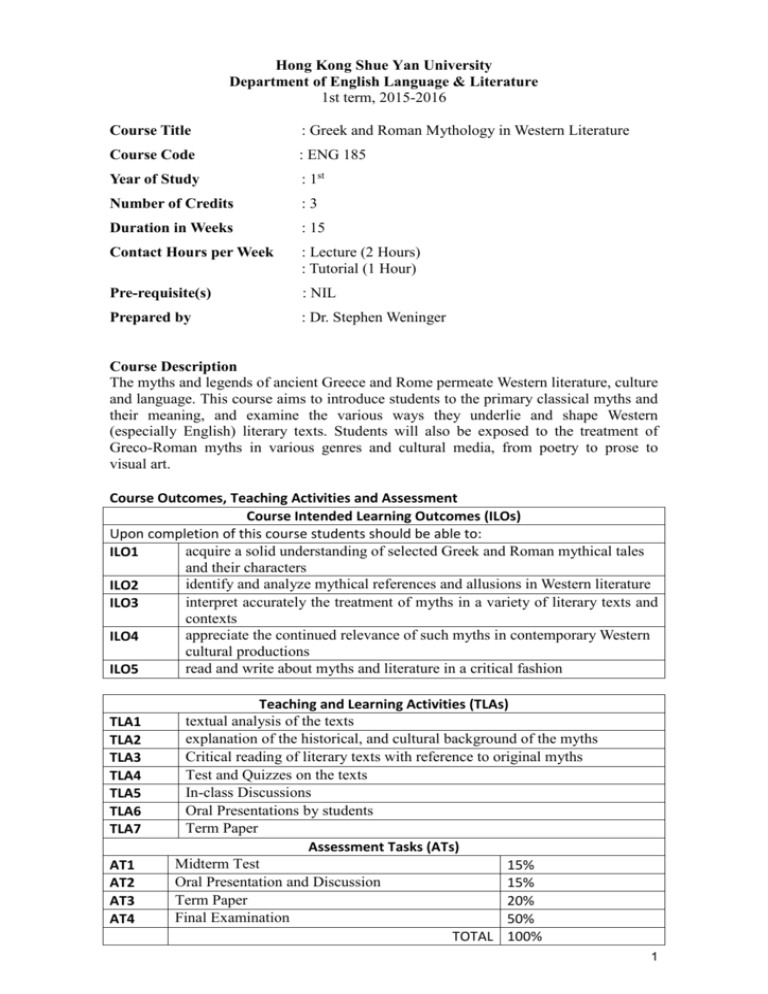
Hong Kong Shue Yan University Department of English Language & Literature 1st term, 2015-2016 Course Title : Greek and Roman Mythology in Western Literature Course Code : ENG 185 Year of Study : 1st Number of Credits :3 Duration in Weeks : 15 Contact Hours per Week : Lecture (2 Hours) : Tutorial (1 Hour) Pre-requisite(s) : NIL Prepared by : Dr. Stephen Weninger Course Description The myths and legends of ancient Greece and Rome permeate Western literature, culture and language. This course aims to introduce students to the primary classical myths and their meaning, and examine the various ways they underlie and shape Western (especially English) literary texts. Students will also be exposed to the treatment of Greco-Roman myths in various genres and cultural media, from poetry to prose to visual art. Course Outcomes, Teaching Activities and Assessment Course Intended Learning Outcomes (ILOs) Upon completion of this course students should be able to: acquire a solid understanding of selected Greek and Roman mythical tales ILO1 and their characters identify and analyze mythical references and allusions in Western literature ILO2 interpret accurately the treatment of myths in a variety of literary texts and ILO3 contexts appreciate the continued relevance of such myths in contemporary Western ILO4 cultural productions read and write about myths and literature in a critical fashion ILO5 TLA1 TLA2 TLA3 TLA4 TLA5 TLA6 TLA7 AT1 AT2 AT3 AT4 Teaching and Learning Activities (TLAs) textual analysis of the texts explanation of the historical, and cultural background of the myths Critical reading of literary texts with reference to original myths Test and Quizzes on the texts In-class Discussions Oral Presentations by students Term Paper Assessment Tasks (ATs) Midterm Test 15% Oral Presentation and Discussion 15% Term Paper 20% Final Examination 50% TOTAL 100% 1 Alignment of Course Intended Learning Outcomes, Teaching and Learning Activities and Assessment Tasks Course Intended Learning Teaching and Learning Assessment Tasks Outcomes Activities ILO1 TLA1,2,5 AT1,3,4 ILO2 TLA2,3 AT1,3,4 ILO3 TLA2,3,5 AT1,3,4 ILO4 TLA1,3,7 AT2,3,4 ILO5 TLA3,6,7 AT1,2,3,4 Course Outline Week 1 Course overview; sources and cultural context of Greco-Roman myths Week 2 Gods, Goddesses, and Titans of the Classical World Prometheus Lord Byron, “Prometheus” J. W. von Goethe “Prometheus” Z. Herbert, “Old Prometheus”; Persephone and Hades A. C. Swinburne, “The Garden of Proserpine”; E. Boland, “The Pomegranate” H. Glenn, “The Daughter’s Visit” Week 3 Week 4 Week 5 The Styx W. Szymborska, “On the Banks of the River Styx” Apollo and Marsyas X. Lin, “Marsyas and the Flute” Z. Herbert, “Apollo and Marsyas” Dionysus D. Schwartz, “Once and For All” Humans, Heroes, and Monsters Icarus and Daedalus W. H. Auden, “Musée des Beaux Art” W. C. Williams “Landscape with the Fall of Icarus” A. Sexton, “To a Friend Whose Work Has Come to Triumph” C. Baudelaire, “The Complaints of an Icarus” C. A. Duffy, “Mrs. Icarus” Perseus and Medusa P. B. Shelley, “On the Medusa by Leonardo da Vinci” C. A. Duffy, “Medusa” Oedipus & the Sphinx J. L. Borges, “Oedipus and the Riddle” Theseus & the Minotaur J. L. Borges “The House of Asterión” Cassandra W. Szymborska, “Soliloquy for Cassandra” B. Andersson and B. Ulvaeus “Cassandra” 2 Sisyphus S. Mitchell, “The Myth of Sisyphus”; L. Clifton, “nothing is told” Tantalus L. Krisak, “Tantalus”; W. Bronk, “The Abnegation” Week 6 The Trojan War and Its Aftermath Helen of Troy C. Marlowe, Doctor Faustus (excerpt) H. D., “Helen” W. Szymborska, “A Moment in Troy” Leda W. B. Yeats, “Leda and the Swan” Week 7 Reading Week Week 8 * Midterm Test* Week 9 Odysseus A. L. Tennyson, “The Lotus-Eaters” and “Ulysses” Y. Ritsos, “Penelope’s Despair” Week 10 Roman Mythology: Virgil’s The Aeneid and Ovid’s Metamorphosis Narcissus S. Plath, “The Mirror” S. Mitchell, “Narcissus” L. Pastan, “Narcissus at 60” Week 11 Pygmalion J. G. Ballard “The Smile” M. Longley, “Ivory and Water” K. Solomon, “Galatea” C. Day Lewis “The Perverse” Weeks 12 A Tale of Love: Orpheus and Eurydice S. Heaney, “Orpheus and Eurydice” & “Death of Orpheus” H. D., “Eurydice” M. Atwood “Orpheus” & “Eurydice” Week 14 The Return of the Gods A. C. Swinburne, “Hymn to Proserpine”; E. Pound, “Pan is Dead” M. Strand, “”There is a luminousness” S. Dobyns, “The Cunning One” Week 15 Reading Week Academic Honesty You are expected to do your own work. Dishonesty in fulfilling any assignment undermines the learning process and the integrity of your college degree. Engaging in dishonest or unethical behavior is forbidden and will result in disciplinary action, specifically a failing grade on the assignment with no opportunity for resubmission. A second infraction will result in an F for the course and a report to College officials. Examples of prohibited behavior are: Cheating – an act of deception by which a student misleadingly demonstrates that s/he has mastered information on an academic exercise. Examples include: 3 Copying or allowing another to copy a test, quiz, paper, or project Submitting a paper or major portions of a paper that has been previously submitted for another class without permission of the current instructor Turning in written assignments that are not your own work (including homework) Plagiarism – the act of representing the work of another as one’s own without giving credit. Failing to give credit for ideas and material taken from others Representing another’s artistic or scholarly work as one’s own Fabrication – the intentional use of invented information or the falsification of research or other findings with the intent to deceive To comply with the University’s policy, papers must be submitted to VeriGuide. Teaching Approach Required reading materials should be read before the lecture. Guidelines for the term paper and class presentation will be provided later. Assessment Midterm Test Class discussion, presentation and participation Term Paper Final Examination 15% 15% 20% 50% 100% (Unannounced quizzes may be given on reading assignments.) Texts Handouts and e-text links Reference Bullfinch, Thomas. Bullfinch’s Mythology. New York: Avenel, 1978. Graves, Robert. The Greek Myths. 2 Volumes. London: Penguin, 1988. Hamilton, Edith. Mythology. Timeless Tales of Gods and Heroes. New York Mentor, 1964. ---, The Greek Way. New York: W. W. Norton, 1993. Larrington, Carolyne. Ed. The Feminist Companion to Mythology. Northampton: Pandora, 1992. Morford, Mark P. O. and Robert J. Lenardom. Classical Mythology. New York: David McKay, 1971. Woodland, Roger D., Ed. The Cambridge Companion to Greek Mythology. Cambridge: Cambridge UP, 2007. 4
